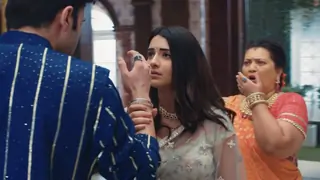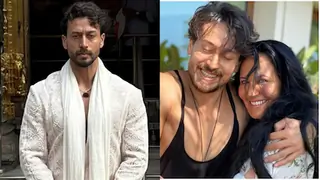Originally posted by: sashashyam
Now this one, my dear Divya, is a post I really relished and agreed with in toto. I am yet to read the excerpts from the Akbarnama, which sound fascinating. Excellent piece of writing, my dear girl!👏
This was one episode about which I wanted to post an analysis, something that has rarely been the case for a long time. I am pasting it here, for you, since you always have problems with Dhwani, It will be on page 40 but I hope you, and some of your readers. will still spot it.
As for Jodha, I do not know how a princess who was always demanding Jalal ka sar - and given that punishments like burning or even flaying alive, walling people in to die and having their heads knocked off by elephants, were common in that age - can be so shocked at what happened to Adham, a traitor and a certified criminal.
The way she is standing, as far from Jalal as possible and with her hands pressed protectively to her stomach, one can be sure that a bhashan on how she is determined to keep her children safe from the influence of such a kroor pita is in the works. That is another reason, besides Rajat's superlative take on Jalal, why I posted this today itself, before I am exasperated beyond bearing by what is to come tonight.
Shyamala Aunty
Folks, Last night's episode belonged entirely to Rajat's Jalal.
The scene that stayed with me was the very last shot of Jalal's frozen face as he looks after a fainting Mahaam Anga who is being led away. There is blood all over, on his forehead, his right cheek, his nose, his chin, his neck, and lines of blood down the left cheek as well. Framed by all this blood, the narrowed, slit-like eyes, under the grim, lowered brows, look sombre and expressionless, their tragedy, and that of the dropping mouth, heightened by the red all around them. They are not cold, nor angry, nor grieving. The molten rage of a little while ago seems to have become congealed in those eyes, which appear to be looking inwards into some private hell to which he has consigned himself.
As Rajat holds that expression for a long, long shot while the camera zooms in, not a muscle in that face moves for nearly a minute. It was a marvelous display of what happens when both rage and grief have crossed the limits of human endurance.
Nemesis for Jalal too: Nemesis is the Greek goddess of retribution to mortals for their sins, and last night she finally caught up, no, not just with Adham Khan, the obvious candidate, but with Jalal as well. Before you start protesting, let me explain why.
It is Jalal's lifelong folly in pardoning his near and dear, or, in Adham's case, not so dear ones for even unpardonable acts - even now he would have spared Adham's life for the attack on the Shahenshah if he had not murdered Atgah - and his unfailing and excessive sense of gratitude to Mahaam Anga for the doodh ka karz ( one wonders whether all wet nurses, who were quite common in those days, wer similarly blessed!) that have brought matters to this pass.
On top of that is his grievous error of judgment in letting Adham rant at him publicly in the Diwan-e-Khas and still get off scot free. For Jalal does this not only because he understands Adham's fury at his mother's arrest, and also his lifelong sense of deprivation of his mother's love, but also because he believes that usme itna dimaag nahin hai ki wo koyo saazish kar sake. So, he is confident that Wo kuch galat nahin karega.
Jalal could not have been more wrong, and his disastrous disregarding of Todar Mal's and Atgah Khan's warning re: Adham Khan is the major reason for Atgah's murder. If you let a venomous snake go free and it bites someone, the fault is more yours than the snake's. This galti will be something that will haunt Jalal for the rest of his life. For the gravity of a fault, or a mistake, lies very largely in the gravity of its consequences.
This said, as far as Rajat's Jalal went, his face, as he talked of how Adham had been deprived of his childhood and his mother's love because of him, was an eloquent study in barely suppressed regret, and the voice was husky with emotion. Afsos to is baat ki hai ki in sab baaton ka karz hum is tarah chukha rahe hain.. And as he ended with Diwan-e-Khas barkhast! , there was a little upward shake of the head that, with the eyes that seemed to be looking back to the past, was incredibly touching.
Molten rage:So when Jalal is now faced with this horrible tragedy that is largely of his own making, both his grief and his rage are stoked not only by Adham's monstrous crimes, but also by the unspoken realization that it is he, the Shahenshah, who has failed his ataliq, the man who, all his life, stood by him and behind him as none other.
When Imad Khan first informs him of Atgah having been murdered, Jalal's face freezes in horrified shock before grief takes over. And when Adham boasts of the same killing, his eyes and face dissolve for an instant into helpless grief, like that of a baby about to cry.
But grief soon gives way to a molten rage which spews forth from Jalal's innermost being like lava from a volcano. The cold menace in his voice as he tells Todar Mal Hum teekh hain, lekin yeh ab teekh nahin rahega.. and proceeds to drag Adham away, is matched only by the suppressed fury with which he pronounces Adham's sentence.
By the icy venom with which he says Adham, mere bhai.. before literally kicking him off the parapet.
By his immovable determination to make Adham pay for all his sins, and not just for the latest one, before he is allowed to die at last.
By the raw rage in his eyes as he commands Is bar isi sar ke bal phenko! By the grim satisfaction with which he looks down at Adham, eyes wide open in death and face mottled with blood.
By the way in which he lifts the huge Adham, staggering a little as he regains his balance, and declares Hum sab ko dikayenge ki hamare azeezon ko nuksan pahunchanewalon ka kya hasher hota hai!
By the way in which he declares, still holding Adham's body aloft, to the assembled multitude (where did all these folks - largely CGI constructs, one presumes! - come from all of a sudden? In historical reality, no one outside the fort knew what had happened for over a day and a half) Aaj is beraham qatil ki maut se Shahenshah Jalaluddin Muhammad Akbar aap sab ko ek tohfa deta hai. Aur deta hai ek paigham, ki iski maut se ek misaal kayam hogi, ki humse gaddari karnewalon ka hashar kya hota hai..
After he hurls Adham's corpse from the battlements down before the crowd, Jalal's blood-streaked face is like that of a grim statue of vengeance. A statue of an ancient deity who has finally meted out just and long overdue punishment for evil, and is satisfied at last.
Hidden self-condemnation: For Jalal is as if possessed, not just by fury at Adham's crimes, and by the unbearable grief at having lost a father figure, but probably also by fury at himself.
Fury at his having been so lenient with Adham for so long that he had become emboldened beyond all limits. Fury at having this stoked his overweening arrogance, and his confidence that he could get away with anything, just as he had done in the past, of which the latest outrages were but the inevitable product.
It is perhaps this consciousness of his own mistakes in the past having led to this calamity, that leads Jalal to justify Adham's execution to his awaam, and that too at such length. Otherwise, it is very difficult to understand why an emperor, having executed a criminal for murder, should bother to explain anything about it to anyone. (It was not as though he was in the habit of explaining every execution, including Todar Mal's, to the public!)
Much less declare, almost defensively, that even if he was condemned in the future for this as a beharam qatil of his doodh bhai, he did not care. Humein koyi farak nahin padta, kyonki ek badshah apne gaddaron ke saath aisa hi salook karta hai..Aaj hum ise maaf kar dete, to hum apne apnon, apni awaam, apna zameeer aur apni zimmedaariyon ke saame gir jaate..Hum khudh ko kabhi maaf nahin kar paate..Isliye humne use maut di...
Now the long lost Badiammi resurfaces unexpectedly. Ab chahe hum zindagi bhar apni Badimmi se nazar nahin mila payein.. Ab chahe humein zindagi bhar badnaami aur rusvaayi ki kaalikh apne muh par potni padi, hum in sab baton ke liye tayyar hain..
What on earth was all that? None of this needed to be said at all. Jalal is the Shahenshah, whose word is law. Besides, the Mughal law too prescribes the death punishment for murder.. Jaan ke badle jaan, yahi Mughal kanoon hai.. Then there is also the gunaah-e-azeem for trying to assassinate the Shahenshah. That Adham was the Shahenshah's doodh bhai should not have counted at all. The death penalty was automatic.
So why then does Jalal go into all these totally unnecessary justifications? They would have been needed if he had let Adham off, not when he has had him duly executed. In fact, the crowds would have sung his praises for his impartial justice, regardless of the person involved.
And who in that crowd would have cared a hoot if Adham had been thrown down a hundred times instead of four? No one. Medieval punishments were often far more cruel. People were burnt alive, or walled in, or flayed alive. It was common for the prisoner's head to be knocked off by an elephant. In Europe in that age, condemned criminals were drawn and quartered, ie, their legs and arms were tied each to one of four horses, which were then made to gallop, thus pulling the body apart into 4 pieces. Men and women were broken on the rack and the wheel, and there were even worse kinds of torture. The population often watched these horrors as public spectacles.
So, I totally failed to comprehend why Jalal was indulging in all this extended , OTT justification, and the above is the only halfway satisfactory explanation I could come up with. That, and the other, self-evident one that deep inside Jalal, the reluctance to punish a person long close to him is so overpowering that it even overcomes his stated determination to never see Mahaam again, and to no longer call her his Badiammi.
The execution of Adham in the film was much more controlled and simple, and thus elegant. Here, it was only Rajat's overpowering performance that compensated for the unnecessarily extended and hyper scene of the Shahenshah addressing his awaam, holding a corpse aloft like Hercules.
Maybe they also wanted to highlight the (historically true) point that Akbar was physically very strong. So, it would seen, is Rajat!
Mahaam: never say die: Ashwini's Mahaam, hoping against hope to save her son's life, was the other bravura performance last night, and though not on par with Rajat's Jalal, it was also very impressive. For one thing, Ashwini has never before got the chance to play Mahaam quite like this.
Initially, there is the shock at what she takes to be the confirmation of her worst fears, the ones triggered by the bloody apparition of a young Jalal that she sees in her cell, in a kind of spooky premonition. She asks Jalal again and again if he is hurt, and then goes on to detail her anxiety about Adham trying to harm him.
When she is told, by a sombre Jalal who looks levelly at her with stony eyes, that Adham had committed a sangeen jurm and had been punished for it, Mahaam deliberately chooses to cling to the idea that her son has been only beaten badly for his crime, and perhaps jailed, but nothing more. She even makes an extraordinary statement: Adham qaid me rahenge to aap mehfoos rahenge aur wo zinda!
As she goes back in time to detail the roots of Adham's jealousy and insane competitiveness vis a vis Jalal, It is fascinating to watch her trying to exculpate a bewakoof Adham who had begum committing these kartoots only out of his foolish rashq of Jalal. Her face works overtime as she makes a desperate effort at hilarity about this: Aap Shahenshan hain aur wo bandi ka beta. Aapse rashq! Bewakoof!!
When she learns that her son has in fact murdered Atgah Khan, cold fear surfaces, but she has still not given up. Cleverly seeking to exploit Jalal's kindness towards Javeda, she seeks clemency for Adham not for her sake, but for Javeda's, mar jaayegi wo Adham ko kuch hogaya to.. In an emotional overdrive, she then offers to bear any punishment in his place, adding that her sansein are still there only because of Adham (there seems to be some obsession with this saansein angle in this show; first it was Jodha during the mirchi war track, then Jalal after the Atifa track, and now Mahaam!) .
As she continues her desperate pleading : Maaf kar dijiye.. use baksh dijiye..it is as if the wall he had erected between them has crumbled, for Jalal hugs Mahaam , and continues to hold her close till she spots Javeda in widow's whites.
The shot of Mahaam's eyes as she takes in this confirmation that her son is no more was marvellous - they were wide and uncomprehending to begin with, but as the truth sank in, they clouded over with sudden grief and despair. She moves out of Jalal's embrace and puts out her finger to touch the blood on his neck, blood that she now knows is her son's, before she faints.
All in all, a very different and praiseworthy take on Mahaam by Ashwini.
Jodha: standard issue: I did not expect anything much from Jodha, but for the life of me I could not understand why, if the proceedings were so shocking and distasteful, she and Hamida continued to stand there like a couple of Romans at the Colosseum in the days of the Emperor Nero. Why did they not retire, once Hamida had, with rare good sense, stopped Jodha from entering the fray to check Jalal from doing anything kroor? Instead, they stayed put till the very end, flinching artistically and turning away their heads every time Adham was thrown down again.
In the precap, when Jalal comes stumbling into her room seeking solace (why the chap does not clean himself up before going there is a mystery. And surely his priority at this point should have been Atgah's family, not Jodha?) far from trying to understand the hell that her husband has gone thru with the loss of Atgah, Jodha treats him to a display of horrified disdain. The way she is standing, as far from him as possible and with her hands pressed protectively to her stomach, one can be sure that a bhashan on how she is determined to keep her children safe from the influence of such a kroor pita is in the works. That is another reason, besides Rajat's superlative take on Jalal, why I posted this today itself, before I am exasperated beyond bearing by what is to come tonight.
I was also amused to hear Jodha's rooh complaining about how people talk even today of Shahenshah Jalaluddin being kroor for the way in which Adham Khan was executed. While Jalal's rooh brushes the matter aside as necessary to set an example to the awaam, I was thinking more of the Chittor massacre of 1568, where Akbar had over 40,000 of the defenders of the fort killed after the fort had fallen, to set an example (and a successful one, witness the early surrender of Ranthambhor) to other recalcitrant enemies.
If Jodha is so upset with her patidev's kroorta towards a certified traitor and criminal like Adham, how would she have reacted to Akbar's really wanton display of cruelty at Chittor? By any odds, she should have burst several blood vessels and retreated to Amer for life. I somehow doubt if Ekta is going to touch on the fall of Chittor! 😉
Questions of the day: 1) How is is that while Salima. Hamida and all the rest are clucking their tongues and grieving for Javeda, no one seems to have a thought to spare for Jijianga, whose husband had, to his last breath, striven to protect Jalal and his takht? It looked almost as if they were all mourning the passing of Adham Khan, but were not particularly concerned about Atgah Khan. And this when Jijianga is one of Hamida's close coterie!
2) Where did they get that white ensemble for Javeda at such short notice, that too with a glowing zari border? Maybe they keep set s of whites ready for all eventualities, but this one fit her perfectly! But no whites for Jijianga?
Seriously, that was so typically and stupidly filmy, the instant widow's weeds. And I had thought that there was no such custom among Muslims in that age. Hamida, for one, does not wear white, does she? Nor does Chand Begum.
3) How come the amount of blood on Jalal's face keeps changing all the time?😉 After Adham is dead and Jalal is looking down at him from the terrace, there is next to nothing. As he gets to the garden, before he lifts Adham, there is already a lot. How come? And in front of the awaam, his face has blood all over except the nose. When he gets to Mahaam, it is there even on the nose!😉 And in the precap, he is practically dripping blood!
Shyamala B.Cowsik
I knew you would do justice to the best episode of Jodha Akbar in my opinion. Your inspired writings gave me chance to relive it.
As for Jodha, I am satisfied she behaved the way she did. The shocked and fearful reaction of Jodha served as a sharp contrast to the magnificently savage Jalal.
Had she accepted Jalal without demur then the momentousness of Jalal's actions would have been lost. Jodha's reaction is a mirror to the viewers to appreciate that.






























